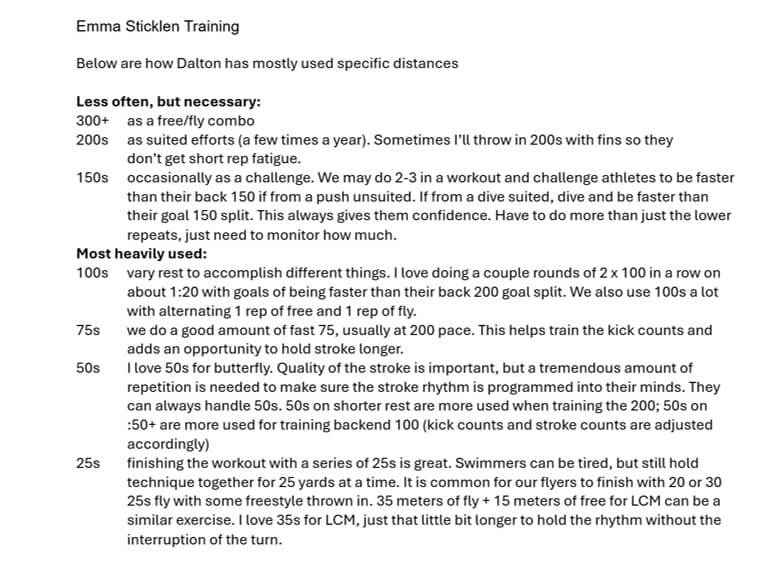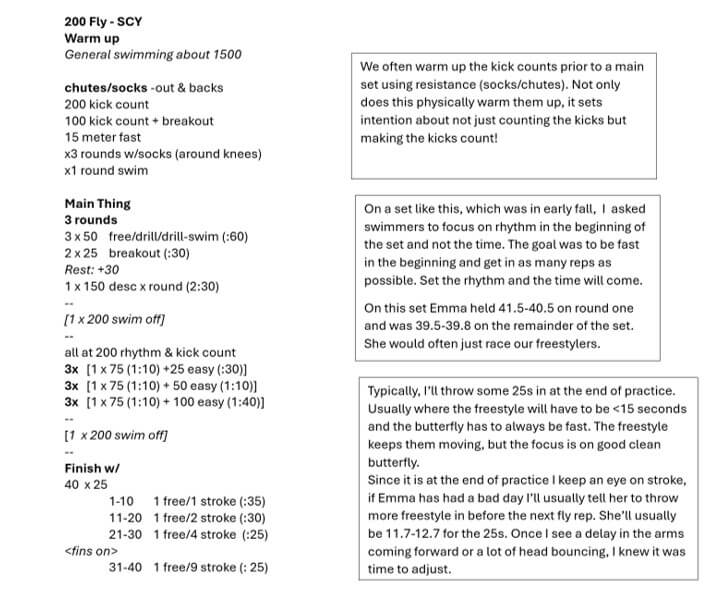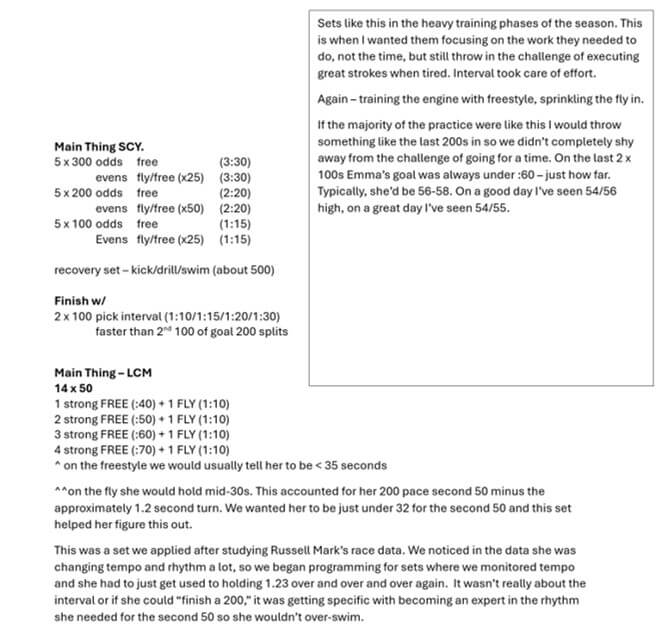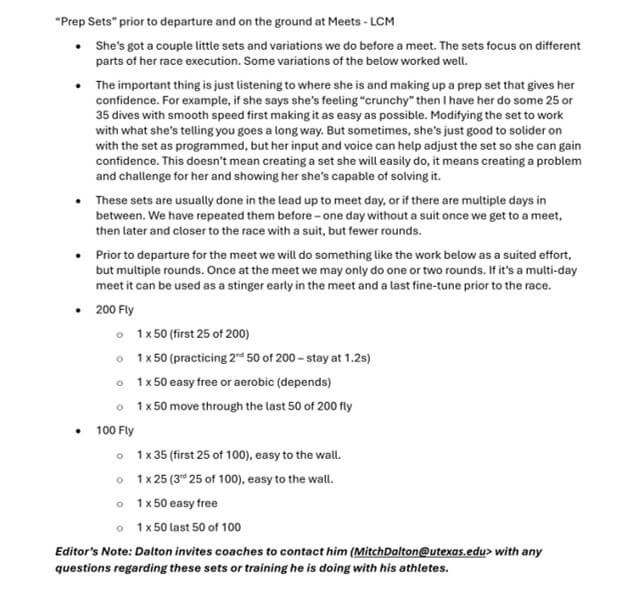
How They Train: The Work of University of Texas NCAA Champion Emma Sticklen
Want a picture of Lady Longhorn Emma Sticklen sailing toward her fifth NCAA championship? Think “hungry for more.” Pursuing a graduate certificate in sport communications, Sticklen is already a 16x first team CSCAA All-American and four-time honorable mention recipient. She is also 12x Big 12 champion, holder of five (two individual) Texas school records, 2x Olympic Trials qualifier and current member of the USA Swimming National Team. Plus, as of mid-January, she has posted the fastest time in the 200 butterfly.
Achieving Greatness
“Emma’s progression at Texas starts with the great coaching and training she received from her Katy Aquatics club coach Tim Bauer. She arrived in Austin hungry to achieve and not afraid to work,” says Texas associate head coach Mitch Dalton.
“Carol, Emma and I have worked together to be all about getting her to swim faster and keep dreaming bigger. I think the cool thing for Emma is she really knows she has two coaches that know all facets of her swimming and life. She is at the stage now where she knows how to use either of us for what she needs in the moment; at practice, at meets and so on.
Courtesy: University of Texas
“Carol has traditionally worked with Emma more in the beginning of the year when she is swimming primarily with our main group. I have coached her more on butterfly specific days and in the summer.
“Emma has built herself into a champion. She arrived at Texas never having made her primary goal – making the USA National Junior Team.” That may have been her only failure. At James E. Taylor in Katy, Texas she was a three-time high school state champion (and state 100 fly record holder, 51.88) and 14x NISCA All-American. The alleged shortcoming “left a chip on her shoulder and a feeling that she never need settle. Accordingly, she set her eyes on the National Team, still coming up one roster spot after both her sophomore and junior years. While hard to deal with in the moment, after processing, she moved forward,” says Dalton.
“Emma is a true example of what a coachable and dedicated athlete can do. Her work ethic is all Emma; we never had to teach her to work. If she had any doubt about that, trying to keep up with Madisyn Cox, Kelly Pash and Olivia Bray taught her that her freshmen year. Her coachability outside the pool has helped her make significant gains in the weightroom, nutrition, recovery, etc.
“Travis Vlantes, our director of sport science, always says if you do your time at Texas correctly, you will graduate with a PhD in your own body. Emma has earned her PhD because she has asked good questions of smart people who are experts and want to help her. Furthermore, she has listened and done the hard work that comes with their advice. She is among the most consistent athletes I have ever seen from an effort standpoint. She knows our system, knows when she needs to go full speed and when the practice just requires good effort and attitude.
“If I could clone one piece of Emma to give as a gift to any swimmer it would be her mind. The mind of champion is what separates athletes not just on meet day, but every day at practice,” says Dalton. “ If you don’t get those mental reps on a daily basis, you will not have them on game day. Emma has an incredible ability to receive a moment, process it and move forward.
“At 2022 she wasn’t happy with her relay split. She said to me, ‘I’m going to warm down for a little, then I need you to give me an attitude adjustment.’ She did, I did, nodded her head, swam a little more, then got out of the water and said ‘Ok, I’m good now! Thanks!’ Emma broke our school record in the following session. Many athletes listen to the doubtful voices in their brain. Emma has those thoughts but spends way more time contemplating the positive optimism of possibility and capability.
“The work Emma did with our out-of-the pool support staff has been cumulative. Absorbing, and using daily, race stats and data provided by USA Swimming’s National Team manager Russell Mark has really helped Emma take her 200 fly to the next level. When Emma first looked at one of Russell’s race stat’s she had no idea what she was seeing. At Olympic trials, we looked at video and her race stats after the 200 fly semifinal and she immediately said “YES! Look at my trend line on the last 50. I nailed it! Oh, and my second 50 was exactly 1.23 like we practiced!” She always had the work ethic of a champion, but in the last two years she has dramatically increased her swimming IQ and awareness.
An Evolution
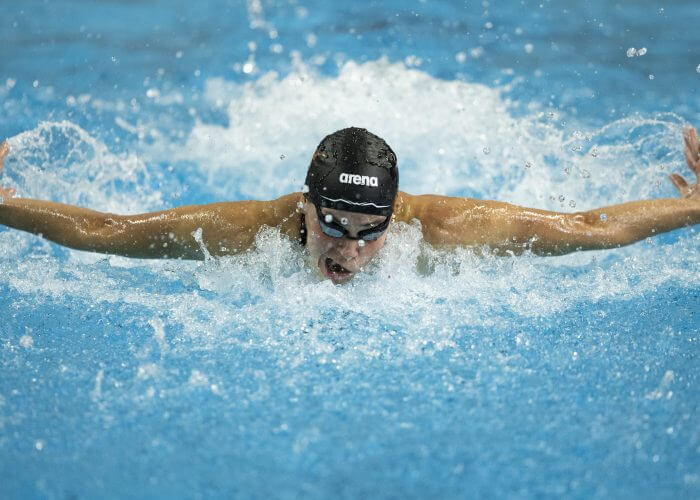
Courtesy University of Texas
“Regarding butterfly the sets I have used at Texas have been heavily influenced by the USA Swimming Butterfly Revolution project. Russell and I have worked closely on exploring the common denominators of U.S. Olympic medalists from 2000 to 2016. We realized American butterfly performance lagged behind other events. It appeared more coaches knew about how Mary T trained than about Dana Vollmer and Michael Phelps. My early work involved studying Dana which led to deep dive conversations with coaches like Gregg Troy, Teri McKeever and Ron Forrest. A later Butterfly Summit camp further exposed us to the insights of Bob Bowman, Mary T and Ian Crocker. I also spent time with Crocker’s age group coach Sharon Powers studying his development.
Learnings from the USA Butterfly Revolution
-Train the engine with freestyle, sprinkle in the stroke
“After a knee injury to Dana, Gregg Troy suggested to her coach Ron Forrest that he reduce the volume of her fly training. Troy suggested “training the engine with freestyle,” and when training the butterfly, perform it with technical proficiency and fast swimming.
-Keep the volume high and the repeat distance short
“We learned coaches liked volume via repeats of 100s, 75s, 50s and 25s, allowing athletes to keep the stroke technically sound. No problem with high volume if done in short distances and on short rest.
Train with the stroke you want to race
“Butterfly is a very technical stroke and rhythm is everything. Flyers must know rhythm, how to establish it and how to hold it. That also applies to tempo, kick counts and breathing patterns. Continually doing sloppy or survival fly sets often dissuade athletes from wanting to even swim butterfly. Occasional test sets can provide challenge and boost confidence.
“The above has been my model when coaching Texas butterflyers, who have had three A finalists in the NCAA 200 fly every year since 2021, earned international medals and multiple national team roster spots.”

